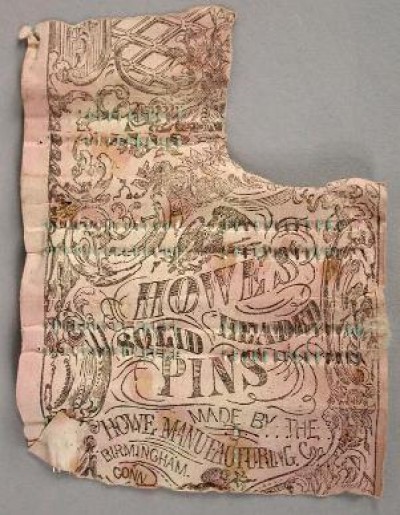On June 22, 1832, John Ireland Howe invented the first practical machine for manufacturing pins. Howe was born in Ridgefield, Connecticut, in 1793 and trained as a doctor, working at the New York Almshouse as a resident physician, where he first observed pins being made by a manual process. The shaping of a straight pin at that time required 18 separate steps. On the strength of the patent for his first pin machine, Howe received backing from a group of New York merchants to establish the Howe Manufacturing Company in 1833. After three years of production in New York, the company moved to the Birmingham section of Derby, Connecticut, where it became one of the largest pin manufacturers in the United States during the 19th century. The Howe Manufacturing Company held 9 of the 47 patents for the manufacturing of pins granted by the US Patent Office between the years of 1790-1873. Howe held two for the design of the pin machines and seven were granted to employees of the company for the pin sticking machines used to package the manufactured pins.
John Howe Makes a Better Pin – Today in History: June 22

Pins made by Howe Manufacturing Co., Birmingham - Connecticut Historical Society
Learn More
58529
8SSNSXS9
1
apsa
50
default
135
https://connecticuthistory.org/wp-content/plugins/zotpress/
%7B%22status%22%3A%22success%22%2C%22updateneeded%22%3Afalse%2C%22instance%22%3Afalse%2C%22meta%22%3A%7B%22request_last%22%3A0%2C%22request_next%22%3A0%2C%22used_cache%22%3Atrue%7D%2C%22data%22%3A%5B%7B%22key%22%3A%22Q9CMPXRI%22%2C%22library%22%3A%7B%22id%22%3A58529%7D%2C%22meta%22%3A%7B%22lastModifiedByUser%22%3A%7B%22id%22%3A14399323%2C%22username%22%3A%22kquotap%22%2C%22name%22%3A%22%22%2C%22links%22%3A%7B%22alternate%22%3A%7B%22href%22%3A%22https%3A%5C%2F%5C%2Fwww.zotero.org%5C%2Fkquotap%22%2C%22type%22%3A%22text%5C%2Fhtml%22%7D%7D%7D%2C%22parsedDate%22%3A%221900%22%2C%22numChildren%22%3A1%7D%2C%22bib%22%3A%22%3Cdiv%20class%3D%5C%22csl-bib-body%5C%22%20style%3D%5C%22line-height%3A%201.35%3B%20padding-left%3A%201em%3B%20text-indent%3A-1em%3B%5C%22%3E%5Cn%20%20%3Cdiv%20class%3D%5C%22csl-entry%5C%22%3E%26%23x201C%3BStereograph%20-%20Howe%20Pin%20Company%2C%20Canal%20in%20Birmingham%20%28Derby%29%20as%20Seen%20from%20the%20Sanford%20Property.%26%23x201D%3B%201900.%3C%5C%2Fdiv%3E%5Cn%3C%5C%2Fdiv%3E%22%2C%22data%22%3A%7B%22itemType%22%3A%22document%22%2C%22title%22%3A%22Stereograph%20-%20Howe%20Pin%20Company%2C%20Canal%20in%20Birmingham%20%28Derby%29%20as%20seen%20from%20the%20Sanford%20Property%22%2C%22creators%22%3A%5B%5D%2C%22abstractNote%22%3A%22%22%2C%22date%22%3A%22ca.%201900%22%2C%22language%22%3A%22%22%2C%22url%22%3A%22%22%2C%22collections%22%3A%5B%228SSNSXS9%22%2C%22SJF9Z2VG%22%2C%22MAU6BUB9%22%2C%22KFIG4I48%22%5D%2C%22dateModified%22%3A%222022-09-19T18%3A52%3A45Z%22%7D%7D%2C%7B%22key%22%3A%22P8IIR65M%22%2C%22library%22%3A%7B%22id%22%3A58529%7D%2C%22meta%22%3A%7B%22lastModifiedByUser%22%3A%7B%22id%22%3A14399323%2C%22username%22%3A%22kquotap%22%2C%22name%22%3A%22%22%2C%22links%22%3A%7B%22alternate%22%3A%7B%22href%22%3A%22https%3A%5C%2F%5C%2Fwww.zotero.org%5C%2Fkquotap%22%2C%22type%22%3A%22text%5C%2Fhtml%22%7D%7D%7D%2C%22creatorSummary%22%3A%22Howe%22%2C%22parsedDate%22%3A%221832-06-22%22%2C%22numChildren%22%3A1%7D%2C%22bib%22%3A%22%3Cdiv%20class%3D%5C%22csl-bib-body%5C%22%20style%3D%5C%22line-height%3A%201.35%3B%20padding-left%3A%201em%3B%20text-indent%3A-1em%3B%5C%22%3E%5Cn%20%20%3Cdiv%20class%3D%5C%22csl-entry%5C%22%3EHowe%2C%20John.%201832.%20%26%23x201C%3BPatent%20Number%207%2C123X%20-%20Pin%20Machine.%26%23x201D%3B%20%3Ca%20class%3D%27zp-ItemURL%27%20href%3D%27https%3A%5C%2F%5C%2Fdocs.google.com%5C%2Fviewer%3Furl%3Dpatentimages.storage.googleapis.com%5C%2Fpdfs%5C%2FUSX7123.pdf%27%3Ehttps%3A%5C%2F%5C%2Fdocs.google.com%5C%2Fviewer%3Furl%3Dpatentimages.storage.googleapis.com%5C%2Fpdfs%5C%2FUSX7123.pdf%3C%5C%2Fa%3E%20%28October%2017%2C%202012%29.%3C%5C%2Fdiv%3E%5Cn%3C%5C%2Fdiv%3E%22%2C%22data%22%3A%7B%22itemType%22%3A%22patent%22%2C%22title%22%3A%22Patent%20Number%207%2C123X%20-%20Pin%20Machine%22%2C%22creators%22%3A%5B%7B%22creatorType%22%3A%22inventor%22%2C%22firstName%22%3A%22John%22%2C%22lastName%22%3A%22Howe%22%7D%5D%2C%22abstractNote%22%3A%22%22%2C%22country%22%3A%22United%20States%22%2C%22assignee%22%3A%22%22%2C%22issuingAuthority%22%3A%22%22%2C%22patentNumber%22%3A%227123X%22%2C%22filingDate%22%3A%22%22%2C%22applicationNumber%22%3A%22%22%2C%22priorityNumbers%22%3A%22%22%2C%22issueDate%22%3A%22June%2022%2C%201832%22%2C%22references%22%3A%22%22%2C%22legalStatus%22%3A%22%22%2C%22language%22%3A%22%22%2C%22url%22%3A%22https%3A%5C%2F%5C%2Fdocs.google.com%5C%2Fviewer%3Furl%3Dpatentimages.storage.googleapis.com%5C%2Fpdfs%5C%2FUSX7123.pdf%22%2C%22collections%22%3A%5B%228SSNSXS9%22%2C%22SJF9Z2VG%22%2C%22MAU6BUB9%22%2C%22KFIG4I48%22%5D%2C%22dateModified%22%3A%222016-06-20T20%3A33%3A35Z%22%7D%7D%2C%7B%22key%22%3A%22DXIM64QB%22%2C%22library%22%3A%7B%22id%22%3A58529%7D%2C%22meta%22%3A%7B%22lastModifiedByUser%22%3A%7B%22id%22%3A14399323%2C%22username%22%3A%22kquotap%22%2C%22name%22%3A%22%22%2C%22links%22%3A%7B%22alternate%22%3A%7B%22href%22%3A%22https%3A%5C%2F%5C%2Fwww.zotero.org%5C%2Fkquotap%22%2C%22type%22%3A%22text%5C%2Fhtml%22%7D%7D%7D%2C%22creatorSummary%22%3A%22Howe%22%2C%22parsedDate%22%3A%221845-12-26%22%2C%22numChildren%22%3A1%7D%2C%22bib%22%3A%22%3Cdiv%20class%3D%5C%22csl-bib-body%5C%22%20style%3D%5C%22line-height%3A%201.35%3B%20padding-left%3A%201em%3B%20text-indent%3A-1em%3B%5C%22%3E%5Cn%20%20%3Cdiv%20class%3D%5C%22csl-entry%5C%22%3EHowe%2C%20John%20J.%201845.%20%26%23x201C%3BPatent%20Number%204%2C324%20-%20Machinery%20For%20Beating%20and%20Cleaning%20Wire.%26%23x201D%3B%20%3Ca%20class%3D%27zp-ItemURL%27%20href%3D%27https%3A%5C%2F%5C%2Fdocs.google.com%5C%2Fviewer%3Furl%3Dpatentimages.storage.googleapis.com%5C%2Fpdfs%5C%2FUS4324.pdf%27%3Ehttps%3A%5C%2F%5C%2Fdocs.google.com%5C%2Fviewer%3Furl%3Dpatentimages.storage.googleapis.com%5C%2Fpdfs%5C%2FUS4324.pdf%3C%5C%2Fa%3E%20%28October%2017%2C%202012%29.%3C%5C%2Fdiv%3E%5Cn%3C%5C%2Fdiv%3E%22%2C%22data%22%3A%7B%22itemType%22%3A%22patent%22%2C%22title%22%3A%22Patent%20Number%204%2C324%20-%20Machinery%20For%20Beating%20and%20Cleaning%20Wire%22%2C%22creators%22%3A%5B%7B%22creatorType%22%3A%22inventor%22%2C%22firstName%22%3A%22John%20J.%22%2C%22lastName%22%3A%22Howe%22%7D%5D%2C%22abstractNote%22%3A%22%22%2C%22country%22%3A%22United%20States%22%2C%22assignee%22%3A%22%22%2C%22issuingAuthority%22%3A%22%22%2C%22patentNumber%22%3A%224%2C324%22%2C%22filingDate%22%3A%22%22%2C%22applicationNumber%22%3A%22%22%2C%22priorityNumbers%22%3A%22%22%2C%22issueDate%22%3A%22December%2026%2C%201845%22%2C%22references%22%3A%22%22%2C%22legalStatus%22%3A%22%22%2C%22language%22%3A%22%22%2C%22url%22%3A%22https%3A%5C%2F%5C%2Fdocs.google.com%5C%2Fviewer%3Furl%3Dpatentimages.storage.googleapis.com%5C%2Fpdfs%5C%2FUS4324.pdf%22%2C%22collections%22%3A%5B%228SSNSXS9%22%2C%22SJF9Z2VG%22%2C%22MAU6BUB9%22%2C%22KFIG4I48%22%5D%2C%22dateModified%22%3A%222016-06-20T20%3A33%3A09Z%22%7D%7D%2C%7B%22key%22%3A%22SV44PSVP%22%2C%22library%22%3A%7B%22id%22%3A58529%7D%2C%22meta%22%3A%7B%22lastModifiedByUser%22%3A%7B%22id%22%3A14399323%2C%22username%22%3A%22kquotap%22%2C%22name%22%3A%22%22%2C%22links%22%3A%7B%22alternate%22%3A%7B%22href%22%3A%22https%3A%5C%2F%5C%2Fwww.zotero.org%5C%2Fkquotap%22%2C%22type%22%3A%22text%5C%2Fhtml%22%7D%7D%7D%2C%22creatorSummary%22%3A%22Howe%22%2C%22parsedDate%22%3A%221843-02-24%22%2C%22numChildren%22%3A1%7D%2C%22bib%22%3A%22%3Cdiv%20class%3D%5C%22csl-bib-body%5C%22%20style%3D%5C%22line-height%3A%201.35%3B%20padding-left%3A%201em%3B%20text-indent%3A-1em%3B%5C%22%3E%5Cn%20%20%3Cdiv%20class%3D%5C%22csl-entry%5C%22%3EHowe%2C%20John%20J.%201843.%20%26%23x201C%3BPatent%20Number%202%2C970%20-%20Machine%20for%20Sticking%20Pins%20in%20Rows%20in%20Sheets%20Of%20Paper.%26%23x201D%3B%20%3Ca%20class%3D%27zp-ItemURL%27%20href%3D%27https%3A%5C%2F%5C%2Fdocs.google.com%5C%2Fviewer%3Furl%3Dpatentimages.storage.googleapis.com%5C%2Fpdfs%5C%2FUS2970.pdf%27%3Ehttps%3A%5C%2F%5C%2Fdocs.google.com%5C%2Fviewer%3Furl%3Dpatentimages.storage.googleapis.com%5C%2Fpdfs%5C%2FUS2970.pdf%3C%5C%2Fa%3E%20%28October%2017%2C%202012%29.%3C%5C%2Fdiv%3E%5Cn%3C%5C%2Fdiv%3E%22%2C%22data%22%3A%7B%22itemType%22%3A%22patent%22%2C%22title%22%3A%22Patent%20Number%202%2C970%20-%20Machine%20for%20Sticking%20Pins%20in%20Rows%20in%20Sheets%20Of%20Paper%22%2C%22creators%22%3A%5B%7B%22creatorType%22%3A%22inventor%22%2C%22firstName%22%3A%22John%20J.%22%2C%22lastName%22%3A%22Howe%22%7D%5D%2C%22abstractNote%22%3A%22%22%2C%22country%22%3A%22United%20States%22%2C%22assignee%22%3A%22%22%2C%22issuingAuthority%22%3A%22%22%2C%22patentNumber%22%3A%222970%22%2C%22filingDate%22%3A%22%22%2C%22applicationNumber%22%3A%22%22%2C%22priorityNumbers%22%3A%22%22%2C%22issueDate%22%3A%22Feb%2024%2C%201843%22%2C%22references%22%3A%22%22%2C%22legalStatus%22%3A%22%22%2C%22language%22%3A%22%22%2C%22url%22%3A%22https%3A%5C%2F%5C%2Fdocs.google.com%5C%2Fviewer%3Furl%3Dpatentimages.storage.googleapis.com%5C%2Fpdfs%5C%2FUS2970.pdf%22%2C%22collections%22%3A%5B%228SSNSXS9%22%2C%22SJF9Z2VG%22%2C%22MAU6BUB9%22%2C%22KFIG4I48%22%5D%2C%22dateModified%22%3A%222016-06-20T20%3A32%3A50Z%22%7D%7D%2C%7B%22key%22%3A%22MN46C6UA%22%2C%22library%22%3A%7B%22id%22%3A58529%7D%2C%22meta%22%3A%7B%22lastModifiedByUser%22%3A%7B%22id%22%3A14399323%2C%22username%22%3A%22kquotap%22%2C%22name%22%3A%22%22%2C%22links%22%3A%7B%22alternate%22%3A%7B%22href%22%3A%22https%3A%5C%2F%5C%2Fwww.zotero.org%5C%2Fkquotap%22%2C%22type%22%3A%22text%5C%2Fhtml%22%7D%7D%7D%2C%22creatorSummary%22%3A%22Howe%22%2C%22parsedDate%22%3A%221841-03-24%22%2C%22numChildren%22%3A1%7D%2C%22bib%22%3A%22%3Cdiv%20class%3D%5C%22csl-bib-body%5C%22%20style%3D%5C%22line-height%3A%201.35%3B%20padding-left%3A%201em%3B%20text-indent%3A-1em%3B%5C%22%3E%5Cn%20%20%3Cdiv%20class%3D%5C%22csl-entry%5C%22%3EHowe%2C%20John%20J.%201841.%20%26%23x201C%3BPatent%20Number%202%2C013%20-%20Machine%20For%20Making%20Pins.%26%23x201D%3B%20%3Ca%20class%3D%27zp-ItemURL%27%20href%3D%27https%3A%5C%2F%5C%2Fdocs.google.com%5C%2Fviewer%3Furl%3Dpatentimages.storage.googleapis.com%5C%2Fpdfs%5C%2FUS2013.pdf%27%3Ehttps%3A%5C%2F%5C%2Fdocs.google.com%5C%2Fviewer%3Furl%3Dpatentimages.storage.googleapis.com%5C%2Fpdfs%5C%2FUS2013.pdf%3C%5C%2Fa%3E%20%28October%2017%2C%202012%29.%3C%5C%2Fdiv%3E%5Cn%3C%5C%2Fdiv%3E%22%2C%22data%22%3A%7B%22itemType%22%3A%22patent%22%2C%22title%22%3A%22Patent%20Number%202%2C013%20-%20Machine%20For%20Making%20Pins%22%2C%22creators%22%3A%5B%7B%22creatorType%22%3A%22inventor%22%2C%22firstName%22%3A%22John%20J.%22%2C%22lastName%22%3A%22Howe%22%7D%5D%2C%22abstractNote%22%3A%22%22%2C%22country%22%3A%22United%20States%22%2C%22assignee%22%3A%22%22%2C%22issuingAuthority%22%3A%22%22%2C%22patentNumber%22%3A%222013%22%2C%22filingDate%22%3A%22%22%2C%22applicationNumber%22%3A%22%22%2C%22priorityNumbers%22%3A%22%22%2C%22issueDate%22%3A%22March%2024%2C%201841%22%2C%22references%22%3A%22%22%2C%22legalStatus%22%3A%22%22%2C%22language%22%3A%22%22%2C%22url%22%3A%22https%3A%5C%2F%5C%2Fdocs.google.com%5C%2Fviewer%3Furl%3Dpatentimages.storage.googleapis.com%5C%2Fpdfs%5C%2FUS2013.pdf%22%2C%22collections%22%3A%5B%228SSNSXS9%22%2C%22SJF9Z2VG%22%2C%22MAU6BUB9%22%2C%22KFIG4I48%22%5D%2C%22dateModified%22%3A%222016-06-20T20%3A32%3A33Z%22%7D%7D%2C%7B%22key%22%3A%22C8MZIPTW%22%2C%22library%22%3A%7B%22id%22%3A58529%7D%2C%22meta%22%3A%7B%22lastModifiedByUser%22%3A%7B%22id%22%3A14399323%2C%22username%22%3A%22kquotap%22%2C%22name%22%3A%22%22%2C%22links%22%3A%7B%22alternate%22%3A%7B%22href%22%3A%22https%3A%5C%2F%5C%2Fwww.zotero.org%5C%2Fkquotap%22%2C%22type%22%3A%22text%5C%2Fhtml%22%7D%7D%7D%2C%22creatorSummary%22%3A%22Howe%20and%20Piper%22%2C%22parsedDate%22%3A%221856-06-10%22%2C%22numChildren%22%3A1%7D%2C%22bib%22%3A%22%3Cdiv%20class%3D%5C%22csl-bib-body%5C%22%20style%3D%5C%22line-height%3A%201.35%3B%20padding-left%3A%201em%3B%20text-indent%3A-1em%3B%5C%22%3E%5Cn%20%20%3Cdiv%20class%3D%5C%22csl-entry%5C%22%3EHowe%2C%20John%20J.%2C%20and%20Truman%20Piper.%201856.%20%26%23x201C%3BPatent%20Number%2015%2C111%20-%20Japanning%20Pins.%26%23x201D%3B%20%3Ca%20class%3D%27zp-ItemURL%27%20href%3D%27https%3A%5C%2F%5C%2Fdocs.google.com%5C%2Fviewer%3Furl%3Dpatentimages.storage.googleapis.com%5C%2Fpdfs%5C%2FUS15111.pdf%27%3Ehttps%3A%5C%2F%5C%2Fdocs.google.com%5C%2Fviewer%3Furl%3Dpatentimages.storage.googleapis.com%5C%2Fpdfs%5C%2FUS15111.pdf%3C%5C%2Fa%3E%20%28October%2017%2C%202012%29.%3C%5C%2Fdiv%3E%5Cn%3C%5C%2Fdiv%3E%22%2C%22data%22%3A%7B%22itemType%22%3A%22patent%22%2C%22title%22%3A%22Patent%20Number%2015%2C111%20-%20Japanning%20Pins%22%2C%22creators%22%3A%5B%7B%22creatorType%22%3A%22inventor%22%2C%22firstName%22%3A%22John%20J.%22%2C%22lastName%22%3A%22Howe%22%7D%2C%7B%22creatorType%22%3A%22inventor%22%2C%22firstName%22%3A%22Truman%22%2C%22lastName%22%3A%22Piper%22%7D%5D%2C%22abstractNote%22%3A%22%22%2C%22country%22%3A%22United%20States%22%2C%22assignee%22%3A%22Howe%20Manufacturing%20Company%22%2C%22issuingAuthority%22%3A%22%22%2C%22patentNumber%22%3A%2215111%22%2C%22filingDate%22%3A%22%22%2C%22applicationNumber%22%3A%22%22%2C%22priorityNumbers%22%3A%22%22%2C%22issueDate%22%3A%22June%2010%2C%201856%22%2C%22references%22%3A%22%22%2C%22legalStatus%22%3A%22%22%2C%22language%22%3A%22%22%2C%22url%22%3A%22https%3A%5C%2F%5C%2Fdocs.google.com%5C%2Fviewer%3Furl%3Dpatentimages.storage.googleapis.com%5C%2Fpdfs%5C%2FUS15111.pdf%22%2C%22collections%22%3A%5B%228SSNSXS9%22%2C%22SJF9Z2VG%22%2C%22MAU6BUB9%22%2C%22KFIG4I48%22%5D%2C%22dateModified%22%3A%222016-06-20T20%3A32%3A17Z%22%7D%7D%5D%7D
“Stereograph - Howe Pin Company, Canal in Birmingham (Derby) as Seen from the Sanford Property.” 1900.
Howe, John. 1832. “Patent Number 7,123X - Pin Machine.” https://docs.google.com/viewer?url=patentimages.storage.googleapis.com/pdfs/USX7123.pdf (October 17, 2012).
Howe, John J. 1845. “Patent Number 4,324 - Machinery For Beating and Cleaning Wire.” https://docs.google.com/viewer?url=patentimages.storage.googleapis.com/pdfs/US4324.pdf (October 17, 2012).
Howe, John J. 1843. “Patent Number 2,970 - Machine for Sticking Pins in Rows in Sheets Of Paper.” https://docs.google.com/viewer?url=patentimages.storage.googleapis.com/pdfs/US2970.pdf (October 17, 2012).
Howe, John J. 1841. “Patent Number 2,013 - Machine For Making Pins.” https://docs.google.com/viewer?url=patentimages.storage.googleapis.com/pdfs/US2013.pdf (October 17, 2012).
Howe, John J., and Truman Piper. 1856. “Patent Number 15,111 - Japanning Pins.” https://docs.google.com/viewer?url=patentimages.storage.googleapis.com/pdfs/US15111.pdf (October 17, 2012).








